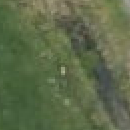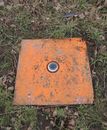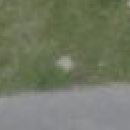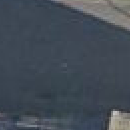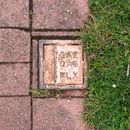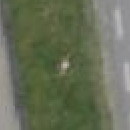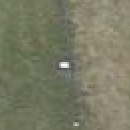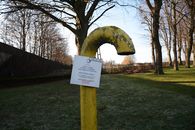User:M!dgard/Pipelines in Belgium
I'm not an expert, but I want to share my observations.
I have plans to create a JOSM tagging preset and map style for these.
Fluxys
Known substances: gas, nitrogen
![]() Fluxys operates a network of high-pressure gas infrastructure in Europe. They have a fairly dense network of gas pipelines in Belgium and also at least one nitrogen pipeline.
Fluxys operates a network of high-pressure gas infrastructure in Europe. They have a fairly dense network of gas pipelines in Belgium and also at least one nitrogen pipeline.
Markers
This tagging follows the general marker scheme, but it actually doesn't suffice to distinguish these markers. Fluxys has a short page about their markers.
The photos in the "aerial photo" column are from AIV's hi-res aerial imagery (2013-2015, 10cm). It does not necessarily show the same marker as the "photo" column.
If you're mapping from aerial imagery and you're not very sure of the type of marker, it's best to map it with just marker=yes.
| Photo | Description | Note | Aerial photo | Visibility on aerial imagery | Tagging |
|---|---|---|---|---|---|
| Aerial beacon | Pole with a yellow roof with a black short reference code, used by the helicopter patrols to follow the pipeline. Not positioned exactly above the pipeline trajectory, so only connect the pipeline to these if there's a single pipe (no parallel pipes) and you can't see other markers nearby (because you don't have street-level imagery and didn't survey, or because there are none). | Easiest to spot, makes it possible to follow pipelines even without survey or street-level imagery. | marker=aerial colour=yellow operator=Fluxys utility=* ref=* | ||
| Pedestal | Orange, concrete pedestal with a metal plate. The vast majority have a reference code on the metal plate (normally embossed, rarely a sticker). I believe they don't make these any more, as they aren't featured on Fluxys' page linked above and some that I saw on aerial imagery have been replaced with poles since the imagery was made. | 
|
Orange blurb. Easiest to spot, makes it possible to follow pipelines even without survey or street-level imagery. | marker=pedestal colour=orange operator=Fluxys utility=* ref=* | |
| Pole with white head | Simple, cylindrical pole, orange with a white top part. They seldom have a reference code. | May be visible, appears as a white dot or stroke. Not usually possible to follow without other sources, due to other objects also appearing as white dots or strokes. | marker=post colour=orange operator=Fluxys utility=* | ||
| Pole with white hat | Cylindrical orange pole with a white "hat". The few I have seen all had a reference code. | May be visible, appears as a white dot or stroke. Not usually possible to follow without other sources, due to other objects also appearing as white dots or strokes. | marker=post colour=orange operator=Fluxys utility=* ref=* | ||
| Flat-headed pole | Orange pole where the top part is flattened. They often have a reference code. | May be visible, appears as a white dot or stroke. Not usually possible to follow without other sources, due to other objects also appearing as white dots or strokes. | marker=post colour=orange operator=Fluxys utility=* ref=* | ||
| Ground plate | Square orange concrete plate, used when a marker is needed on a track. | Looks like a pedestal, but the colour is usually less saturated. | marker=ground colour=orange operator=Fluxys utility=* | ||
| Ground plaque | Small metal plaque in a road surface. Used when a marker is needed on a road. Sometimes there's an orange ring painted around it to increase visibility. | Impossible to see without prior knowledge. If you know the location you may be able to spot small disturbances in the road surface if it is sufficiently smooth. That allows you to improve the accuracy of your location. | marker=ground operator=Fluxys utility=* | ||
| Ground plaque with arrows | Old-fashioned small metal plaque in a road surface. It's painted orange and has arrows that show the direction of the pipeline. Used when a marker is needed on a road. | Impossible to see without prior knowledge. If you know the location you may be able to spot small disturbances in the road surface if it is sufficiently smooth. | marker=ground colour=orange operator=Fluxys utility=* | ||
| Ground button | Small composite plastic/metal button in a road surface with the text "nv.Fluxys.sa. GAS–GAZ". Used when a marker is needed on a road. Sometimes there's an orange ring painted around it to increase visibility. | Not sure if it's possible to see them. | marker=ground operator=Fluxys utility=* | ||
| Orange cathodic protection measurement point | Openable plastic pillar placed on the pipeline trajectory. The ones I have seen never had a reference code. | marker=pedestal measurement=corrosion colour=orange description=kathodischebeschermingsmeetpunt operator=Fluxys utility=* | |||
| Beige cathodic protection measurement point | Openable plastic pillar placed away from the pipeline trajectory, so don't connect the pipeline to these. Never has a reference code. | measurement=corrosion colour=beige description=kathodischebeschermingsmeetpunt operator=Fluxys utility=* |
Reference codes on aerial beacons
I don't know if this holds in general, but reference codes on the aerial beacons I have seen consist of three numbers and/or letters, optionally followed by a superscript letter. Presumably that superscript letter is for aerial beacons that were inserted between two existing ones. Add it after an underscore. Examples: ref=Y64 (no superscript letter), ref=03B_A (the A is typeset as superscript on the marker).
Other reference codes
Reference codes have been seen formatted as 3-12345-0001, 312345 0001 and FLX 3.12345 nr 1. You can map them like ref=3-12345-0001 regardless of how they are formatted on the pole. The 3-12345 part is the code of the pipeline, the 0001 part is the sequence number of the marker.
Pipelines
Tagging
- man_made=pipeline
- substance=gas, sometimes nitrogen
- operator=Fluxys operator:wikidata=Q1336773
- Most of the time location=underground, sometimes overground or overhead
- usage=transmission except in a substation
- ref=* if you have seen it on a marker. Use the format
3-12345
Identified pipes
Overpass query for pipes that have a reference
- 3-04120
 between Zeebrugge LNG terminal and station 4.04124 Dudzele Oostkerkestraat
between Zeebrugge LNG terminal and station 4.04124 Dudzele Oostkerkestraat - 3-04250
 ending at station 4.04124 Dudzele Oostkerkestraat
ending at station 4.04124 Dudzele Oostkerkestraat - 3-07114
 ending at station 4.08110 Ramskapelle-telling
ending at station 4.08110 Ramskapelle-telling - 3-07118
 ending at station 4.04124 Dudzele Oostkerkestraat, nitrogen
ending at station 4.04124 Dudzele Oostkerkestraat, nitrogen - 3-07120
 between Zeebrugge LNG terminal and station 4.04124 Dudzele Oostkerkestraat
between Zeebrugge LNG terminal and station 4.04124 Dudzele Oostkerkestraat - 3-07131
 between station 4.04124 Dudzele Oostkerkestraat and Herdersbrug power station
between station 4.04124 Dudzele Oostkerkestraat and Herdersbrug power station - 3-07250
 ending at station 4.07100 Zeebrugge telling I.Z.T.F. passing through station 4.04124 Dudzele Oostkerkestraat
ending at station 4.07100 Zeebrugge telling I.Z.T.F. passing through station 4.04124 Dudzele Oostkerkestraat - 3-07600
 passes north-east of Lochristi
passes north-east of Lochristi - 3-08500
 passing through station 4.04124 Dudzele Oostkerkestraat
passing through station 4.04124 Dudzele Oostkerkestraat - 3-31090
 between Oorbeek and Lubbeek
between Oorbeek and Lubbeek - 3-32550
 near Kapelle-op-den-Bos
near Kapelle-op-den-Bos - 3-41040
 near Aalst
near Aalst - 3-41300
 ending at industrial client in Oostende
ending at industrial client in Oostende - 3-41520
 between station 4.41540 Destelbergen ontspanning and Fluvius station G4007 in Gentbrugge
between station 4.41540 Destelbergen ontspanning and Fluvius station G4007 in Gentbrugge - 3-41530
 between dead-end valve group(?!) in Nijverheidskaai, Gentbrugge and valve group Scheldekant Destelbergen
between dead-end valve group(?!) in Nijverheidskaai, Gentbrugge and valve group Scheldekant Destelbergen - 3-41540
 ending at station 4.41540 Destelbergen ontspanning passing through valve group 4.41510 Melle - knooppunt
ending at station 4.41540 Destelbergen ontspanning passing through valve group 4.41510 Melle - knooppunt - 3-41560
 ending at station 4.41540 Destelbergen ontspanning
ending at station 4.41540 Destelbergen ontspanning - 3-42120
 between Fluvius station G4007 in Gentbrugge and valve group near Ghelamco Arena, Gent
between Fluvius station G4007 in Gentbrugge and valve group near Ghelamco Arena, Gent - 3-42129
 between valve group near Coca Cola, Gent and Fluvius station in Zwijnaarde
between valve group near Coca Cola, Gent and Fluvius station in Zwijnaarde - 3-42172
 ending at Fluvius station in Zwijnaarde
ending at Fluvius station in Zwijnaarde - 3-42180
 between valve near Ter Handbrug, Merelbeke and Fluvius station G4015 in Merelbeke
between valve near Ter Handbrug, Merelbeke and Fluvius station G4015 in Merelbeke - 3-42182
 ending at valve near Ter Handbrug, Merelbeke
ending at valve near Ter Handbrug, Merelbeke - 3-42187
 between valve group near Coca Cola, Gent and Coca Cola, Gent
between valve group near Coca Cola, Gent and Coca Cola, Gent - 3-42189
 between valve group near Coca Cola, Gent and Amcor Flexibles industry, Gent passing through valve group near Ghelamco Arena, Gent
between valve group near Coca Cola, Gent and Amcor Flexibles industry, Gent passing through valve group near Ghelamco Arena, Gent - 3-42350
 north-west of Ghent
north-west of Ghent - 3-42420
 west of Ghent
west of Ghent - 3-42470
 west of Ghent-Terneuzen Canal
west of Ghent-Terneuzen Canal - 3-42500
 ending at Ham power station
ending at Ham power station - 3-46331
 between Fluvius station G4002 in Bruges and Genencor International
between Fluvius station G4002 in Bruges and Genencor International - 3-47130
 between valve group Blondeellaan Zeebrugge and Fluvius station G4001 in Blankenberge
between valve group Blondeellaan Zeebrugge and Fluvius station G4001 in Blankenberge - 3-47136
 between valve group Evendijk-West Zeebrugge and station 4.07100 Zeebrugge telling I.Z.T.F.
between valve group Evendijk-West Zeebrugge and station 4.07100 Zeebrugge telling I.Z.T.F. - 3-47240
 between station 4.48042 Nieuwpoort and unidentifiable station in Nieuwpoort
between station 4.48042 Nieuwpoort and unidentifiable station in Nieuwpoort - 3-47510
 ending at station 4.08110 Ramskapelle telling
ending at station 4.08110 Ramskapelle telling - 3-47512
 ending at station 4.08110 Ramskapelle telling
ending at station 4.08110 Ramskapelle telling - 3-47550
 ending at somewhere near the Zeepipe terminal passing through station 4.04124 Dudzele Oostkerkestraat
ending at somewhere near the Zeepipe terminal passing through station 4.04124 Dudzele Oostkerkestraat - 3-47580
 between station 4.47530 Dudzele and Fluvius station G4002 in Bruges
between station 4.47530 Dudzele and Fluvius station G4002 in Bruges - 3-47720
 between station 4.47530 Dudzele and valve group Blondeellaan Zeebrugge
between station 4.47530 Dudzele and valve group Blondeellaan Zeebrugge - 3-48400
 ending at station 4.47530 Dudzele
ending at station 4.47530 Dudzele - 3-86780
 between Wanze and Namur
between Wanze and Namur
Substations
Tagging
- pipeline=substation landuse=industrial
- substance=gas
- operator=Fluxys operator:wikidata=Q1336773
- ref=*, e.g. 4.04124
- name=*
- description=* for additional information, e.g. compressiestation
Air Liquide
Known substances: hydrogen, oxygen
![]() Air Liquide is an international supplier of different gases. One of their activities is a hydrogen pipeline network in Belgium. Maybe they have other pipelines too.
Air Liquide is an international supplier of different gases. One of their activities is a hydrogen pipeline network in Belgium. Maybe they have other pipelines too.
Markers
| Photo | Description | Note | Aerial photo | Visibility on aerial imagery | Tagging |
|---|---|---|---|---|---|
| Aerial beacon | Pole with an red roof with a white short reference code, used by the helicopter patrols to follow the pipeline. Not positioned exactly above the pipeline trajectory, so only connect the pipeline to these if there's a single pipe (no parallel pipes) and you can't see other markers nearby (because you don't have street-level imagery and didn't survey, or because there are none). | Easiest to spot, makes it possible to follow pipelines even without survey or street-level imagery. | marker=aerial colour=red operator=Air Liquide utility=* ref=* | ||
| Blue pole with white head | Simple, cylindrical pole, blue with a white top part. | May be visible, appears as a white dot or stroke. Not usually possible to follow without other sources, due to other objects also appearing as white dots or strokes. | marker=post colour=blue operator=Air Liquide utility=* ref=* |
Total
Known substances: fluid hydrocarbons
| Photo | Description | Note | Aerial photo | Visibility on aerial imagery | Tagging |
|---|---|---|---|---|---|
| Aerial beacon | Pole with an orange roof with a black short reference code, used by the helicopter patrols to follow the pipeline. Not positioned exactly above the pipeline trajectory, so only connect the pipeline to these if there's a single pipe (no parallel pipes) and you can't see other markers nearby (because you don't have street-level imagery and didn't survey, or because there are none). | Easiest to spot, makes it possible to follow pipelines even without survey or street-level imagery. | marker=aerial colour=orange operator=Total utility=oil ref=* | ||
| Pedestal | Yellow, concrete pedestal with a metal plate that has a reference code. | Yellow blurb. Easiest to spot, makes it possible to follow pipelines even without survey or street-level imagery. | marker=pedestal colour=yellow operator=Total utility=oil ref=* | ||
| Pole with yellow head | Simple, cylindrical pole, yellow with a yellow top part. They have a metal plate that has a reference code. | May be visible, appears as a yellow dot or stroke. Not usually possible to follow without other sources, due to other objects also appearing as yellow dots or strokes. | marker=post colour=yellow operator=Total utility=oil ref=* | ||
| Pole with curved top | Simple, cylindrical pole, yellow with a curved top. They have a metal plate that has a reference code. | May be visible, appears as a yellow dot or stroke. Not usually possible to follow without other sources, due to other objects also appearing as yellow dots or strokes. | marker=post colour=yellow operator=Total utility=oil ref=* |
Nationale Maatschappij der Pijpleidingen
Known substances: ethylene


